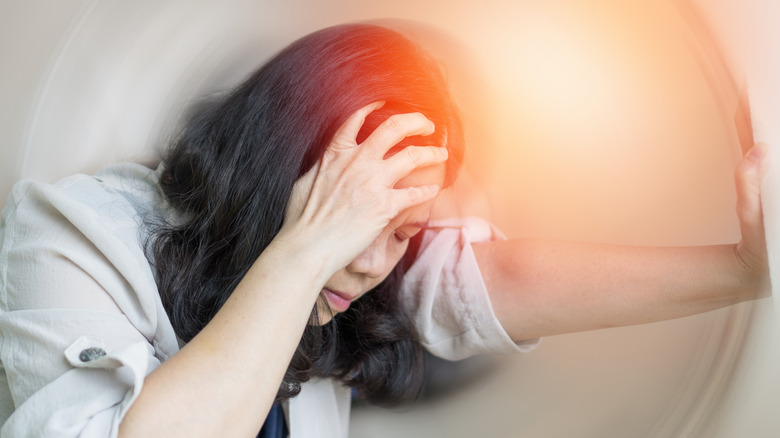Reasons You Could Be Dizzy After Eating
Dizziness occurs when your spatial orientation is impaired and is linked to many health conditions, according to the Cleveland Clinic. For example, some may feel dizzy after eating, as per Healthline. But sometimes, the dizziness that occurs after eating is a case of getting up too fast after sitting for a while. Not knowing what triggers this dizziness can be dangerous, so it's vital to take note of any other accompanying symptoms and consult with your primary doctor.
Nausea and feeling faint are among the most commonly occurring symptoms of dizziness. In addition, WebMD also notes that heart palpitations can occur with dizziness after consuming heavy meals. In more severe cases, dizziness after consuming food might co-exist with chest pains and visual changes caused by a circulatory problem that severely restricts blood flow to the brain (via Healthline). Experiencing confusion, sweating, and nervousness could also accompany any case of dizziness.
Possible causes
If you start to feel dizzy after eating, keep in mind the causative factors are numerous and can be very unrelated to the food you just ate. One such cause is blood pressure levels dropping too quickly after eating (via Medical News Today). This condition is known as postprandial hypotension, which is common in people with hypertension due to the effects high blood pressure has on the arteries. Stiffened arteries can limit blood flow to the brain, especially after a heavy meal when blood is also trying to reach other essential body parts, like the digestive system. The less oxygen-rich blood your brain gets, the more susceptible you may be to dizziness (per WebMD).
According to the National Institute of Diabetes and Digestive and Kidney Diseases (NIDDK), there's enough research to support the relationship between low blood glucose and dizziness. Low blood glucose is more likely among people with Type 2 diabetes because of their insulin shots and diabetic medications. But too much insulin can quickly reduce blood glucose levels, per Mayo Clinic. The source reiterates that shakes and jitters are very common symptoms of low blood glucose. When your blood sugar is low, your brain overworks to preserve optimum energy, leading to lightheadedness. Healthline adds that this condition can also persist in people without diabetes, as certain foods can cause the body to release excess insulin, overwhelming the processing of blood sugar. This eventually causes blood glucose levels to drop, leading to symptoms, like dizziness, after eating.
When to see a doctor
It can be difficult to tell what factors are causing you to feel dizzy after eating, explains Mayo Clinic. Nevertheless, it's vital to see a doctor after a recurrent, sudden, severe, prolonged, or unexplained episode of dizziness. If feeling unbalanced comes with symptoms like breathing difficulties, numbness, blurred vision, or seizures, be sure to call an emergency helpline.
Doctors can usually only recommend treatment options after diagnosing the specific cause of the dizziness, as per Healthline. Manage the lightheaded feeling by drinking plenty of water and eating several small meals rather than one large meal. With regard to postprandial hypotension, it's important to listen to your body when symptoms kick in. According to Harvard Health Publishing, blood pressure issues usually bear symptoms about one hour after consuming a meal. Therefore, taking things easy during this period, when dizziness is most likely to occur, can be a great way to cope.



